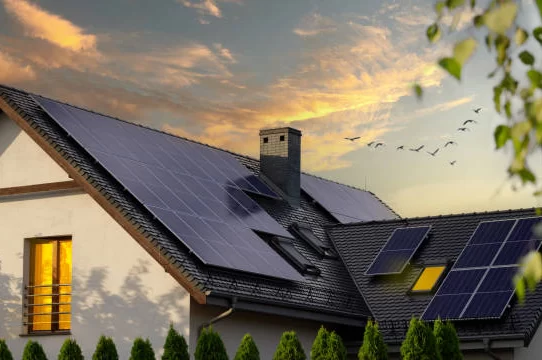The Best Solar Panels for a House: A Comprehensive Guide
When it comes to considering solar panels for a house, making the right choice is crucial. Not all solar panels are created equal, and several factors need to be taken into account to ensure you select the best option that meets your energy needs, budget, and long-term goals.

One of the primary considerations is the efficiency of the solar panels. Higher efficiency panels can generate more electricity from the same amount of sunlight. For example, monocrystalline solar panels are known for their relatively high efficiency compared to polycrystalline panels. If you have limited roof space but high energy demands, opting for highly efficient monocrystalline panels might be the best choice.
The brand and reputation of the manufacturer also play a significant role. Established and well-regarded brands often offer better quality control, warranties, and customer support. Companies like SunPower and LG are known for producing reliable solar panels that have stood the test of time. Researching customer reviews and industry ratings can give you valuable insights into the performance and durability of different brands.
The durability of the solar panels for a house is another important factor. You want panels that can withstand various weather conditions, including hail, strong winds, and extreme temperatures. Panels with a strong frame and tempered glass are more likely to resist damage and have a longer lifespan. Some manufacturers offer extended warranties that provide additional peace of mind regarding the durability of their products.
The cost of the solar panels is undoubtedly a key consideration. However, it’s important to look beyond the upfront purchase price. Consider the overall cost of ownership, which includes installation costs, maintenance expenses, and the potential savings on your electricity bills over the lifespan of the panels. Sometimes, investing in slightly more expensive but higher-quality panels can lead to greater savings and fewer issues in the long run.
It’s also essential to assess the power output and wattage of the solar panels for a house. This depends on your household’s energy consumption. If you have a large home with many appliances and high electricity usage, you’ll need panels with a higher power output to meet your needs. A professional solar installer can conduct an energy audit to determine the appropriate size and capacity of the solar panel system for your house.
Another factor to consider is the aesthetic appeal of the panels. Some homeowners are concerned about how the panels will look on their roof. Certain models are designed to be more visually appealing or can be installed in a way that minimizes their visual impact. For instance, black-on-black solar panels can blend in better with darker roof colors.
The type of inverter you pair with the solar panels for a house is also important. Microinverters or string inverters each have their advantages and disadvantages. Microinverters offer more flexibility and can optimize the performance of each individual panel, but they tend to be more expensive. String inverters are a more cost-effective option for larger systems but may be less efficient if one panel is shaded or underperforming.
In addition to these technical aspects, local climate and sunlight conditions should be taken into account. If you live in an area with less sunlight or frequent cloudy days, you might need to choose panels that perform well in low-light conditions or install a larger system to compensate.
To illustrate, consider the case of the Johnson family. They live in a sunny region and decided to install solar panels on their house. After careful research and consultation with a professional installer, they chose high-efficiency monocrystalline panels from a reputable brand. They also opted for a microinverter system to maximize the output of each panel. Despite the higher initial cost, they have seen a significant reduction in their electricity bills and are expected to recoup their investment within a few years.
The Smith family, on the other hand, had a limited budget but still wanted to go solar. They chose mid-range polycrystalline panels and a string inverter system. While their savings aren’t as substantial as the Johnsons’, they are still satisfied with the reduction in their energy costs and the contribution they are making to the environment.
In conclusion, choosing the best solar panels for a house requires a comprehensive assessment of various factors. By considering efficiency, brand reputation, durability, cost, power output, aesthetics, inverter type, local conditions, and your specific energy requirements, you can make an informed decision that will provide you with clean, reliable, and cost-effective energy for years to come.
